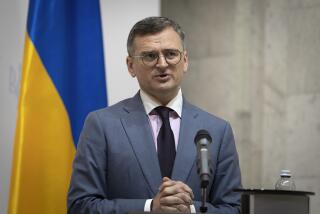Top Russian Officials Offer Resignations : Kremlin: Defense, Interior, security chiefs and others assume responsibility for hostage crisis. Yeltsin puts off any decision.
- Share via
MOSCOW — Russia’s top military, police and security chiefs on Thursday offered to resign for the deadly bungling of a hostage crisis earlier this month, but President Boris N. Yeltsin put off a decision on which heads should roll until after a faceoff with Parliament on Saturday.
The mea culpas offered by Defense Minister Pavel S. Grachev, Interior Minister Viktor F. Yerin, security forces chief Sergei V. Stepashin and other senior officials gave Yeltsin a chance to mend fences with rivals in the fractious state Duma, the lower house of Parliament.
Deputies outraged by the government’s handling of a June 14 raid by Chechen guerrillas on the southern town of Budennovsk have insisted that the “power ministers” who failed to protect Russia be sacked for incompetence.
At least 123 people were killed in the attack, and more than 1,000 people were held hostage for six days.
At a special session of the Russian Security Council, summoned by Yeltsin to review the Budennovsk bloodshed, the president openly cast blame on the troops and police for causing Russia to suffer “serious moral and political damage.”
“The events in Budennovsk demonstrated to Russians and to the whole world a low level of competence by the special services in resolving complicated tasks,” Yeltsin told the Cabinet and legislative leaders who make up the council, according to the quasi-official Itar-Tass news agency.
But Yeltsin demonstrated little urgency in deciding which resignations to accept, promising only to report back to the council by July 10.
Yeltsin’s government, headed by Prime Minister Viktor S. Chernomyrdin, suffered an overwhelming vote of no-confidence by the Duma on June 21 for its response to the raid staged in Budennovsk by Chechen guerrillas in retaliation for the Kremlin’s war against their independence campaign.
That vote was a toothless censure of Yeltsin and his Cabinet by the Duma, but the president stepped up the pressure between the Kremlin and the Parliament by demanding a second vote and setting into motion a constitutional chain of events that could give him the power to disband the unruly Duma.
*
Under the strong-presidency constitution, Yeltsin would be compelled either to fire Chernomyrdin and his Cabinet or to dissolve the Duma and call new elections if a second no-confidence vote were to be taken within three months of the first.
By forcing a second vote and warning that his preference would be to disband the Duma, Yeltsin put his parliamentary rivals on notice that they were in effect voting on their own future.
With parliamentary elections due in December, the deputies are loath to lose their public platform and perquisites--such as fax machines, cars and telephones--that will be vital to reelection.
On the other hand, to retract the no-confidence vote without a concession from Yeltsin would expose the Duma as an ineffective and inconsequential political force that is easily manipulated by the president.
*
Yeltsin reportedly cut a deal behind closed doors with parliamentary faction leaders earlier this week by saying he would refrain from forcing the no-confidence issue Saturday if an initial vote fails for lack of a quorum.
He has also promised to identify those officials who bear responsibility for the Budennovsk disaster and take appropriate action.
At least 20 civilians were killed when Russian security forces twice stormed the hospital where the hostages were being held.
The Duma would also have a face-saving pretext for reversing its vote against the government if peace talks--part of the resolution of the hostage stand-off--produced a treaty and an end to the war that has threatened Russia’s economic stability and badly damaged its human rights record.
Expectations of an accord rose with the bloodless conclusion of the hostage crisis in Budennovsk, which Chernomyrdin brought about by agreeing to negotiations with those loyal to Chechen separatist leader Dzhokar M. Dudayev and granting safe passage to the hostage-takers in return for release of their captives.
Those talks, in the Chechen capital of Grozny, were adjourned Thursday and are expected to resume in Moscow next week.
More to Read
Sign up for Essential California
The most important California stories and recommendations in your inbox every morning.
You may occasionally receive promotional content from the Los Angeles Times.














